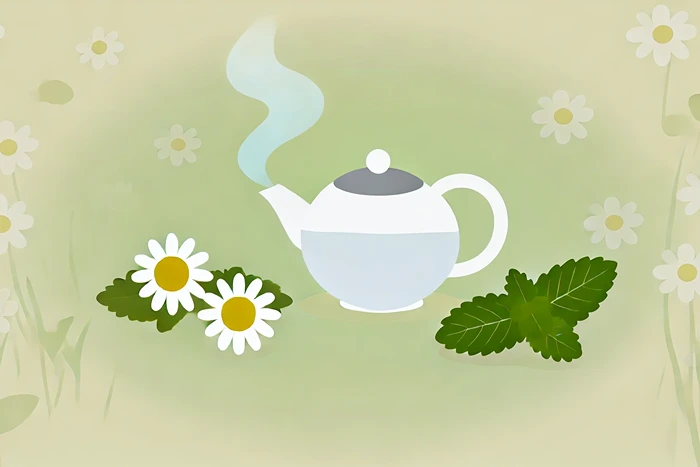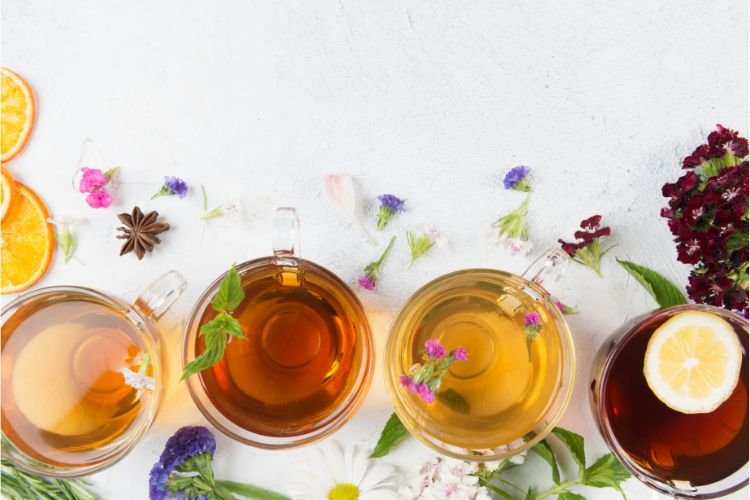
Herbal Remedies for Managing IBS Symptoms Naturally
For those dealing with Irritable Bowel Syndrome (IBS), the unpredictable symptoms can be incredibly frustrating. From bloating to cramping and those unexpected trips to the bathroom, IBS has a way of interrupting daily life. Thankfully, there are herbal remedies that have been used for centuries to help manage these symptoms naturally. In this article, we’ll explore various herbal solutions to ease discomfort and bring more balance to your digestive system.
What is IBS, and Why Seek Natural Remedies?
IBS, or Irritable Bowel Syndrome, is a digestive disorder affecting millions of people. Its exact cause is unknown, but stress, diet, and gut bacteria imbalances often play a role. Symptoms can vary from person to person but generally include abdominal pain, bloating, diarrhea, constipation, or a combination of both. These flare-ups can be unpredictable, making it hard to manage day-to-day activities.
Many people turn to herbal remedies for managing IBS symptoms naturally. Prescription medications can have side effects, while herbal treatments tend to be gentler on the body. Moreover, these remedies often address the root causes, such as inflammation, stress, and digestive issues, offering a more holistic approach to treatment.
How Peppermint Can Help Ease IBS Symptoms
Peppermint is one of the most widely recommended herbs for IBS, and it’s easy to see why. Peppermint contains menthol, a natural compound that helps relax the muscles in the digestive tract. This relaxation can ease cramping, bloating, and discomfort, making it a top choice for those dealing with IBS-related pain.
Studies have shown that peppermint oil, taken in enteric-coated capsules, can significantly reduce IBS symptoms. The coating ensures that the oil reaches the intestines without breaking down too early in the stomach, which could lead to heartburn. Many people find that incorporating peppermint tea into their daily routine helps soothe their digestive system, particularly after meals.
Helpful Hint:
For maximum effectiveness, try drinking peppermint tea after meals to calm your digestive system and prevent bloating. It’s a simple yet effective way to manage your IBS symptoms naturally.
How to Use Peppermint for IBS Relief
- Drink peppermint tea after meals.
- Use peppermint oil capsules, preferably enteric-coated, to avoid irritation in the stomach.
- Apply diluted peppermint oil to the abdomen to soothe cramping.
Can Ginger Help With IBS Symptoms?
Ginger has been used for centuries to calm upset stomachs, and it can be a great help for managing IBS symptoms naturally. This root is known for its anti-inflammatory properties and ability to enhance digestion. For IBS sufferers, ginger can help reduce nausea, bloating, and gas.
Gingerol, the active compound in ginger, works by stimulating digestive juices and enzymes, which can help ease constipation and promote smoother digestion. Whether you prefer ginger tea, capsules, or even freshly grated ginger, it can provide soothing relief to an overactive digestive system.
Stats:
A study found that 53% of participants with IBS experienced significant symptom improvement after using ginger supplements for four weeks.
How to Incorporate Ginger Into Your Routine
- Add fresh ginger to hot water for a soothing tea.
- Include ginger in your meals, such as stir-fries and soups.
- Take ginger supplements in capsule form for more consistent relief.
Why Fennel Seeds Are a Natural Remedy for IBS
Fennel seeds are another excellent choice for managing IBS symptoms naturally. They are known for their ability to reduce bloating and gas, two common complaints among those with IBS. Fennel works by relaxing the gastrointestinal muscles and expelling trapped gas, making it a popular remedy for digestive discomfort.
In addition to easing gas, fennel seeds can also help with constipation and digestive cramps. They are rich in fiber, which can promote regular bowel movements, and their natural antispasmodic properties make them ideal for easing abdominal pain.
How to Use Fennel Seeds for IBS
- Chew on fennel seeds after meals to aid digestion.
- Make fennel seed tea by steeping crushed seeds in hot water.
- Add fennel seeds to your cooking, particularly in soups and stews, to enhance flavor and promote digestion.
Helpful Hint:
For an easy digestion-boosting tea, combine fennel seeds with peppermint and ginger for a powerful trifecta of digestive support.
Chamomile: A Gentle Option for IBS

Chamomile is a popular herb known for its calming properties, and it can be a gentle way to manage IBS symptoms naturally. Chamomile helps reduce inflammation in the digestive tract, easing cramping and discomfort. It’s also great for relieving stress, which can often trigger IBS flare-ups.
For those dealing with both digestive issues and anxiety, chamomile offers a double benefit. Sipping on chamomile tea before bed can promote relaxation, help with sleep, and soothe your digestive system, making it easier to manage symptoms.
How to Use Chamomile for IBS
- Drink chamomile tea daily, particularly in the evening, to promote relaxation and ease digestion.
- Add dried chamomile flowers to your bath for a soothing soak that helps relieve stress.
Turmeric: A Powerful Anti-Inflammatory for IBS

Turmeric, a golden-yellow spice commonly found in curries, has gained popularity for its anti-inflammatory properties. The active compound in turmeric, curcumin, is known for reducing inflammation throughout the body, making it an excellent herbal remedy for managing IBS symptoms naturally.
One of the main challenges with IBS is the irritation and inflammation that can occur in the gut lining. Turmeric can help reduce this inflammation, leading to less pain, bloating, and discomfort. Curcumin has also been shown to promote better digestion by stimulating bile production, which helps break down fats and ensures smoother digestion.
Stats:
A study published in the “Journal of Clinical Medicine” found that 70% of IBS patients who used curcumin experienced a significant reduction in abdominal pain and bloating within eight weeks.
How to Use Turmeric for IBS Relief
- Add turmeric powder to your cooking, especially in soups, stews, or stir-fries.
- Take turmeric supplements (with black pepper for better absorption) to ensure a higher intake of curcumin.
- Mix turmeric with warm water or milk to make a soothing drink known as “golden milk.”
How Licorice Root Helps Soothe IBS Symptoms
Licorice root has been used in traditional medicine for centuries to address digestive issues, and it remains a popular herbal remedy for IBS. Licorice root contains compounds that help soothe and heal the digestive tract. Its anti-inflammatory and soothing properties can ease cramping, heartburn, and indigestion, making it an excellent option for those with IBS.
The key to licorice’s effectiveness lies in a compound called glycyrrhizin, which reduces inflammation in the gut and protects the stomach lining from irritation. For IBS sufferers, licorice root can bring relief to both pain and discomfort caused by flare-ups.
Helpful Hint:
If you’re sensitive to licorice, consider taking DGL (deglycyrrhizinated licorice), which removes the compound that can cause high blood pressure in some individuals. This form still provides digestive relief without the unwanted side effects.
Ways to Incorporate Licorice Root
- Drink licorice root tea before or after meals to calm your digestive system.
- Take DGL tablets, which are designed to soothe the stomach without affecting blood pressure.
- Use licorice root in powdered form, added to hot water or smoothies.
Slippery Elm: A Soothing Solution for IBS
Slippery elm is a lesser-known herbal remedy that’s perfect for managing IBS symptoms naturally. This herb works by creating a protective coating along the digestive tract, reducing irritation and inflammation. It’s particularly helpful for people with IBS who experience diarrhea, as it helps to firm up stools and ease cramping.
Slippery elm also encourages the production of mucus in the intestines, which can further protect the gut lining and aid in smoother digestion. It’s been used traditionally to treat various digestive disorders, making it a natural and gentle option for IBS relief.
How to Use Slippery Elm for IBS
- Take slippery elm in powder form mixed with water for a soothing drink.
- Use slippery elm lozenges, which can calm digestive upset and soothe the throat.
- Add slippery elm to smoothies or oatmeal for an extra boost of digestive support.
Aloe Vera: Does It Really Help With IBS?
Aloe vera is widely known for its soothing properties, often used to treat skin irritations, but it can also help those with IBS. Aloe vera juice, in particular, is known for its anti-inflammatory and healing effects on the digestive system. It can help reduce bloating, discomfort, and irregular bowel movements.
While some people with IBS have found relief from aloe vera juice, it’s essential to choose the right form. The latex found in the outer skin of the aloe leaf can act as a strong laxative, which could exacerbate diarrhea in people with IBS. For this reason, look for aloe vera juice that is labeled as “latex-free” or “inner leaf only.”
Helpful Hint:
Always start with small amounts of aloe vera juice to see how your body reacts. Some people with IBS may be more sensitive to its laxative effects, even if the juice is latex-free.
How to Use Aloe Vera for IBS Relief
- Drink a small amount of latex-free aloe vera juice daily to soothe the digestive tract.
- Mix aloe vera juice into smoothies or other drinks for a gentle introduction to this remedy.
- Use aloe vera gel in topical form to relieve stress-related skin conditions, often a side effect of IBS flare-ups.
Are Probiotics Effective for IBS?
While not exactly a herb, probiotics are worth mentioning because of their critical role in managing IBS symptoms naturally. Probiotics are beneficial bacteria that can restore balance to the gut flora, a common issue for people with IBS. An imbalance in gut bacteria is often linked to worsening IBS symptoms such as bloating, gas, and irregular bowel movements.
Probiotic-rich foods like yogurt, kefir, sauerkraut, and kombucha can help introduce good bacteria into your digestive system. Alternatively, taking a probiotic supplement specifically formulated for gut health can also help regulate digestion and reduce IBS flare-ups.
Stats:
Research suggests that up to 73% of people with IBS saw improvements in their symptoms after regularly consuming probiotics for a period of four weeks.
How to Incorporate Probiotics for IBS Relief
- Consume probiotic-rich foods daily, such as yogurt, kimchi, or kefir.
- Take a high-quality probiotic supplement to promote healthy gut bacteria.
- Incorporate fermented foods into meals for an easy way to boost your probiotic intake.
Can Marshmallow Root Soothe IBS Symptoms?
Marshmallow root is a soothing herb that has been used traditionally to treat digestive issues, making it another excellent herbal remedy for managing IBS symptoms naturally. This herb works by creating a protective layer over the mucous membranes of the digestive tract, helping to reduce inflammation and irritation. It’s particularly useful for those who experience diarrhea or abdominal cramping, as it soothes and calms the digestive system.
Marshmallow root contains mucilage, a gelatinous substance that coats and protects the stomach lining, much like slippery elm. For IBS sufferers, this herb can offer relief from painful flare-ups and reduce the overall sensitivity of the digestive tract.
How to Use Marshmallow Root for IBS Relief
- Drink marshmallow root tea for a gentle, calming effect on the digestive system.
- Take marshmallow root supplements in capsule form for more concentrated benefits.
- Add marshmallow root extract to smoothies or water for an easy daily intake.
Helpful Hint:
If you’re prone to flare-ups, consider drinking marshmallow root tea throughout the day to keep your digestive system calm. It’s a gentle option that won’t overwhelm your system.
Valerian Root: Easing IBS Symptoms Through Stress Relief
Stress and IBS are often closely linked, with stress being a significant trigger for many IBS sufferers. Valerian root is an herbal remedy known for its ability to reduce stress and anxiety, which can, in turn, help with managing IBS symptoms naturally. When stress levels are high, the digestive system often reacts negatively, leading to symptoms like cramping, bloating, and discomfort.
Valerian root helps relax both the mind and body, making it easier to manage stress-related IBS flare-ups. By calming the nervous system, valerian can prevent the digestive spasms that cause pain and discomfort. Many people use valerian root as a natural sleep aid, but it can also be helpful during the day for managing stress-related symptoms.
How to Use Valerian Root for IBS
- Drink valerian root tea in the evening to reduce stress and promote relaxation.
- Take valerian root capsules during the day to manage stress levels and ease IBS symptoms.
- Use valerian tinctures for a more potent dose when needed, especially during stressful times.
How Calendula Can Help with IBS
Calendula, often known for its skin-soothing properties, is also a powerful herbal remedy for digestive issues, making it a great option for those managing IBS symptoms naturally. Calendula has anti-inflammatory and antispasmodic effects, helping to calm down an irritated digestive system. Its soothing properties are particularly beneficial for people with IBS who experience cramping and discomfort after meals.
Calendula is often used in teas or tinctures to promote overall digestive health. It can also help with gut healing, particularly if your IBS symptoms are related to inflammation in the digestive tract. Adding calendula to your herbal routine can offer gentle, effective relief for various IBS symptoms.
How to Use Calendula for IBS Relief
- Drink calendula tea regularly to reduce digestive inflammation and cramping.
- Add calendula tincture to water or juice for more concentrated relief.
- Apply calendula salve to your abdomen to ease digestive pain and discomfort.
Herbal Blends for IBS Relief
Sometimes, the best way to manage IBS symptoms naturally is to combine multiple herbs into one powerful blend. Herbal blends are a great way to address several symptoms at once, whether you’re dealing with bloating, cramping, diarrhea, or constipation. You can create your own herbal blends at home by mixing herbs like peppermint, fennel, ginger, and chamomile, or you can find pre-made blends that are designed specifically for digestive support.
When creating your own blend, consider your most dominant symptoms. For example, if bloating and gas are your main issues, you might focus on peppermint and fennel. If you experience frequent cramping, ginger and chamomile can be more effective. By tailoring the blend to your needs, you can find more targeted relief for your specific IBS symptoms.
Example Herbal Blend for IBS
- Peppermint: For bloating and gas relief.
- Ginger: To reduce inflammation and improve digestion.
- Chamomile: To calm the digestive tract and reduce stress.
- Fennel: To ease cramping and promote regular bowel movements.
Helpful Hint:
Experiment with different herbal blends to find what works best for your IBS symptoms. Try brewing a tea using a combination of herbs or taking supplements that include a mix of digestive-supporting herbs.
How Long Do Herbal Remedies Take to Work for IBS?
When using herbal remedies to manage IBS symptoms naturally, patience is key. Unlike prescription medications that may offer immediate relief, herbal treatments can take longer to show noticeable results. However, their long-term benefits can often outweigh the immediate effects of medications, particularly because they tend to have fewer side effects and can address the root causes of IBS.
Generally, you may start to see improvements within a few days to a week, but consistent use is important for lasting relief. For herbs like turmeric, ginger, and peppermint, it’s best to take them daily as part of your routine to prevent flare-ups and manage symptoms over time.
Is It Safe to Use Herbal Remedies for IBS?
For most people, herbal remedies for managing IBS symptoms naturally are safe, but it’s always wise to consult with a healthcare provider before beginning any new treatment, especially if you’re on medication or have other health conditions. While herbs are natural, they can still interact with certain medications or cause side effects in some individuals.
Pay attention to how your body reacts to each herb. Start with small amounts and monitor any changes. If you experience any adverse reactions, discontinue use and consult a healthcare professional. It’s important to approach herbal remedies with the same care and attention as you would with any other treatment option.
Can Herbal Remedies Completely Cure IBS?
While herbal remedies can significantly help manage IBS symptoms naturally, it’s important to note that IBS does not have a one-size-fits-all cure. Irritable Bowel Syndrome is a chronic condition, and its symptoms can vary widely from person to person. The goal of using herbal remedies is to reduce the frequency and severity of symptoms, rather than to completely eliminate them.
For many people, combining herbal remedies with other lifestyle changes—such as stress management, dietary adjustments, and regular physical activity—provides the best results. Herbal remedies can offer long-term relief when incorporated into a broader holistic approach, helping you manage flare-ups and lead a more comfortable, balanced life.
Helpful Hint:
Consider tracking your symptoms in a journal to see how your body responds to different herbal remedies and lifestyle changes. This can help you identify triggers and create a more effective management plan tailored to your needs.
When to Seek Medical Advice for IBS
While herbal remedies can be incredibly effective for managing IBS symptoms naturally, there are times when professional medical advice is necessary. If your symptoms worsen, become more frequent, or are accompanied by additional issues like weight loss, bleeding, or persistent pain, it’s crucial to consult a healthcare provider. These could be signs of more serious conditions such as inflammatory bowel disease (IBD) or celiac disease, which require medical attention.
Herbal remedies are a helpful tool, but they should not be a substitute for professional medical advice in cases where symptoms are severe or persist despite treatment. It’s always a good idea to work alongside a healthcare provider who understands your unique needs and can guide you in your IBS management journey.
Other Natural Remedies to Consider for IBS
In addition to herbal remedies, there are other natural methods you can explore to help manage IBS symptoms. These treatments focus on reducing stress, improving digestion, and supporting overall gut health, all of which play a crucial role in managing IBS.
Dietary Adjustments
Your diet has a significant impact on your IBS symptoms. Many people find relief by following a low FODMAP diet, which limits certain carbohydrates that are poorly absorbed by the small intestine. By avoiding these triggers, you can reduce bloating, gas, and other common IBS symptoms.
Additionally, increasing fiber intake, staying hydrated, and eating smaller, more frequent meals can help promote smoother digestion. It’s also beneficial to keep track of which foods trigger your symptoms and make adjustments accordingly.
Stress Management Techniques
Since stress is a major trigger for IBS flare-ups, finding effective ways to manage stress can greatly improve your symptoms. Techniques such as mindfulness meditation, yoga, deep breathing exercises, and regular physical activity are all excellent ways to lower stress levels and promote relaxation.
These stress management techniques, when combined with herbal remedies, can create a more balanced approach to managing IBS and help prevent future flare-ups.
Exercise and Movement
Regular exercise helps keep the digestive system functioning smoothly and reduces stress, making it an important part of any IBS management plan. Activities like walking, swimming, and yoga can help stimulate digestion and ease constipation. Even light daily movement can improve digestion and reduce IBS symptoms.
FAQs
Wrapping Up
Managing IBS symptoms naturally with herbal remedies offers a gentle yet effective approach to improving your digestive health. By incorporating herbs like peppermint, ginger, and fennel into your routine, you can reduce bloating, cramping, and discomfort, allowing for better control over IBS flare-ups. The key to success lies in consistency and a holistic approach, combining herbal treatments with stress management, dietary adjustments, and mindful lifestyle choices.
While there is no one-size-fits-all solution for IBS, experimenting with different remedies and staying in tune with your body can lead to long-term relief. Always remember that what works for one person may not work for another, so patience is essential when trying new herbal treatments. If symptoms persist or worsen, it’s important to seek professional advice to ensure you’re on the right path.
By adopting a natural and balanced approach, you can manage IBS symptoms more effectively and improve your overall well-being. Explore these herbal remedies,

